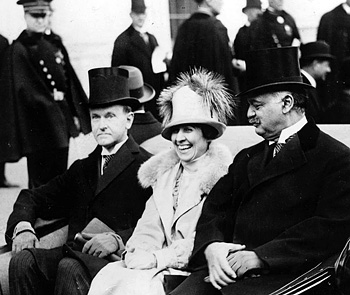Overview
The Coolidge Administration’s principal objective was to restore the Federal government’s finances to peacetime basis and by doing so, to encourage and facilitate the country’s return to normalcy. The Administration’s primary focus was on reducing the huge war debt, followed by cutting the high wartime tax rates. This was accompanied by an unceasing effort to make the governmental establishment operate efficiently, effectively, and economically. The newly created Bureau of the Budget, which fell under President Coolidge’s direct supervision, played a principal role in this process. President Coolidge himself made pioneering use of the radio to reach out twice annually to the American people to report on the progress of his economic program.
Debt, Tax, and Budget Reductions
National debt lowered from $22.3 billion in 1923 to $16.9 billion in 1929.
Harding/Coolidge/Mellon Tax Cuts: After years of very high wartime tax rates, rates were reduced significantly under the Revenue Acts of 1921, 1924, and 1926, especially the latter, which was the crowning achievement of Coolidge tax program. The combined top marginal normal and surtax rate declined from 73 percent to 58 percent in 1922. In 1924, the top tax rate decreased to 46 percent (income over $500,000). The top rate was only 25 percent (income over $100,000) from 1925 to 1928, and then fell temporarily to 24 percent in 1929. It is also worth noting that numerous “nuisance” taxes, such as on cars and theatre tickets, were eliminated.
Federal budget reduced from $5.1 billion in 1921 to $3.1 billion in 1929.
Significant Legislation of the Coolidge Administration
- World War Adjusted Compensation Act of May 19, 1924, also known as the Soldiers’ Bonus Act
- Foreign Service Act of May 24, 1924, also known as the Rogers Act
- Indian Citizenship Act of June 2, 1924
- Immigration Act of May 26, 1924, also known as the Johnson-Reed Act
- Revenue Act of June 2, 1924
- Protection of Forest Act of June 7, 1924, also known as the Clarke-McNary Act
- The United States Arbitration Act of Feb. 12, 1925, also known as the Federal Arbitration Act
- Revenue Act of February 26, 1926
- Public Buildings Act of May 25, 1926, also known as the Elliot-Fernald Act
- Air Commerce Act of May 20, 1926 (Note: One year to the day later, Lindbergh’s commenced his historic trans-Atlantic flight.)
- River and Harbor Act of January 21, 1927, authorizing the Atlantic Intracoastal Waterway
- The McFadden-Pepper Act of Feb. 25, 1927
- Radio Act of February 23, 1927
- Mississippi River Flood Control Act of May 15, 1928
- Merchant Marine Act of May 22, 1928, also known as the Jones-White Act
- Revenue Act of May 29, 1928
Significant Vetoes
- May 15, 1924: Vetoed the Veterans Bonus Bill; overridden by Congress.
- February 25, 1927: First veto of the McNary-Haugen Farm Bill
- May 29, 1928: Second veto of the McNary-Haugen Farm Bill
